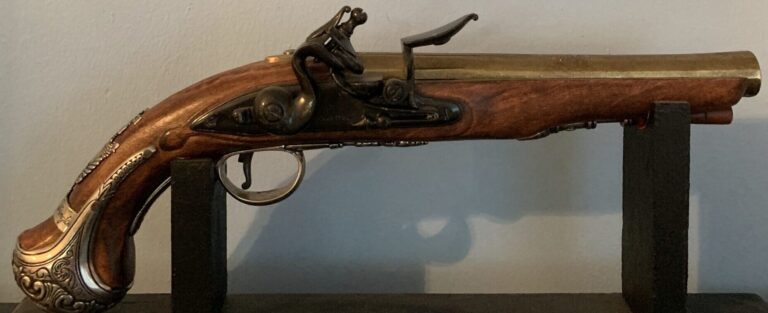An Officer and a Gentleman
The practice of dueling among Continental Army officers must be viewed in relation to the sensibilities that American society in the eighteenth century expected them to exhibit as military gentlemen. The feelings that were encompassed in the prevailing, even obsessive, concern among this social stratum for maintaining one’s self-respect and avoiding disgrace ran the gamut from honor to shame and were inextricably tied to an officer’s need for public recognition of his accomplishments and public vindication if he was openly criticized by any of his peers. In the social environment of this period, issues concerning whether someone was perceived as engaging in honorable conduct or not were immensely important to the persons involved, in some cases even to the point of life or death.
In his study of the Continental Army, Charles Royster observes that the relationships officers developed among each other probably helped insulate them from the critical perspectives of both enlisted soldiers and the civilian population (A Revolutionary People at War: The Continental Army and American Character, 1775-1783, The University of North Carolina Press, 1979). “Officers could judge each other’s character,” he writes, “by the criteria that only they understood.”
Can’t We All Just Get Along?
Caroline Cox tells us that officers’ sensitivity to issues such as rank and honor occasionally gave rise to disputes among each other over “perceived slights” the led to charges resulting in a court of inquiry or a court-martial (A Proper Sense of Honor: Service and Sacrifice in George Washington’s Army, The University of North Carolina Press, 2004). Some incidents involved the conduct of young officers that was deemed by senior officers to fall short of appropriate standards of gentlemanly conduct. In other cases, however, squabbles erupted between senior officers over a perceived insult leveled by one against the other or against a third officer—and sometimes these precipitated a resolution by less orderly or formal means than a judicial proceeding.
During the army’s Valley Forge encampment in the winter of 1777-1778, the practice of dueling between Continental officers “in defense of honor” became more common, according to Royster. Perhaps the best-known of these incidents occurred when Pennsylvania militia general John Cadwalader confronted General Thomas Conway, who had allegedly instigated the so-called “Conway Cabal” to remove General Washington from command and resigned his commission as major general in April 1778 after his supposed intrigue was exposed. Cadwalader—who admired Washington and detested Conway—accused the latter of cowardice, and Conway challenged him to a duel. In the ensuing affair on July 4, 1778, Cadwalader wounded Conway in the mouth, but the latter survived. Such encounters between officers were typically over real or imagined insults.
Although dueling was officially prohibited in the Continental Army, the practice was rarely discouraged or punished, according to Royster. In fact, it conformed to the etiquette of officers in European armies and the time-honored code of gentlemanly conduct, although such incidents were rare at the beginning of the war when, as Royster puts it, “American officers were first striving to become military gentlemen.” It wasn’t until after the Valley Forge winter that dueling occurred more frequently, to the point that it became “so much in vogue among the Gentlemen of our Army” according to a New Jersey Gazette article of March 17, 1779. Indeed, France’s minister to the United States Gerard de Rayneval wrote home on January 17, 1779 that “[the] rage for duelling here has reached an incredible and scandalous point” and was viewed “as the appanage of liberty.”
So What was the (ahem) Upshot of All This?
Royster believes that the incidence of these affairs increased because they “settled questions of honor in a distinctive, gallant way for men newly self-conscious about their uniqueness and their proper public inviolability” and so demonstrated to everyone, including themselves, that these proud and sentimental officers comprised “a separate order of men.” The other side of this coin is that they developed close friendships with each other in the conviction that “the intimacy in their life of keener patriotism, risk, and pride prepared them to understand each other’s experiences and opinions better than anyone else could.” So this self-conscious ethos among Continental officers (uh oh) triggered an intensity of feeling that encompassed strong sentiments, both of friendship and honor. If the latter was challenged, the dark side of this fraternity could rear its ugly head in a deadly or disabling exchange of fire.

